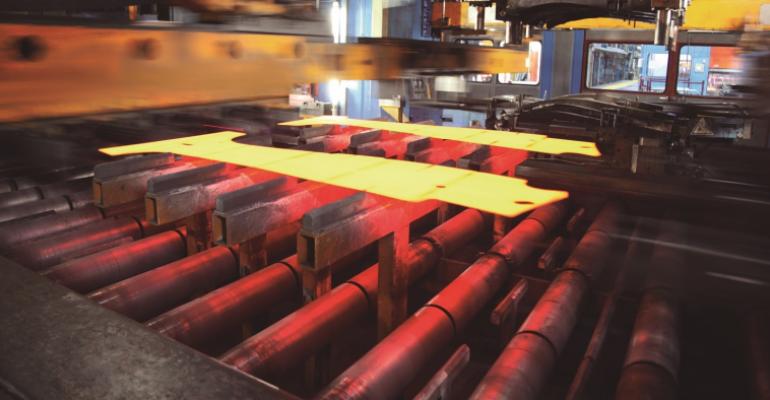BARCELONA – Automaker owned and run press shops, also known as stamping plants, could become a thing of the past.
That’s the prediction from Spanish supplier Gestamp, which says the process increasingly will be outsourced with the advance of hot-stamping, as the industry strives to lightweight vehicles.
“This growth in outsourcing is coming from two main areas (and) one is the movement among carmakers from traditional cold-stamping to hot-stamping in order to reduce weight and improve emissions,” Francisco Riberas, Gestamp executive chairman, tells media here during a recent tour of its plant near Barcelona.
As proof of the impending death of automaker press shops, Riberas points to the recent announcement by Jaguar Land Rover that it will be moving production of the Land Rover Discovery to Nitra, Slovakia, where Gestamp, the world’s largest hot-stamper of body-in-white (large body shell and chassis) parts, will run the press shop.
He says the move to outsource only will grow as automakers pursue lightweighting, using increasing amounts of very high-strength, hot-stamped body panels for their vehicles.
“Many carmakers are planning to completely outsource the press shop,” Riberas says. “At the moment, whenever you visit a traditional plant, there is a press shop in the middle of the plant. Now we are seeing more examples of carmakers opening plants outside their home market where they have decided to completely outsource the press shop and this is a very important growth potential for us.”
The process of hot-stamping began with defunct Swedish automaker Saab in the 1970s and it allows steel panels to be produced with strength to match that of high-tensile steel at a fraction of the cost.
Today, very high-strength steel alloys are heated to 900 degrees C (1,652 degrees F) before being stamped into shape. Such alloys are stiff and brittle at normal temperatures, but when heated to such high temperatures they can be formed into the complex shapes necessary for large body parts.
These individually stamped shapes then can be welded together to form highly impact-resistant vehicle body parts that make up a modern vehicle’s safety cage.
Riberas says JLR was so set on outsourcing its press shop at its new Eastern European facility that it was designed with Gestamp’s press shop as a key component within the assembly plant.
The executive chairman says JLR and Gestamp have inked a long-term agreement for more than two production cycles and the supplier will produce the majority of all the stampings required for the Discovery. The JLR Slovakia plant has a capacity to assemble 200,000 units, stampings for which represent about 2% of Gestamp’s income, Riberas says.
He quotes research showing the trend to increase hot-stamping will guarantee the growth of the supplier’s global operations in coming years.
“Figures show that in 2015, hot-stamping accounted for about 8% of the material used in vehicles and this will move to about 17% by 2025,” Riberas says. “So the market for us will grow from €6 billion ($6.9 billion) to more than €17 billion ($19.6 billion) and we are in a good position to take advantage of this situation.”
Riberas also touts his company as automakers move towards modular global platforms, warning only large global Tier 1 suppliers will be able to exploit the growth potential.
“One carmaker plans by 2021 to use just three global platforms to build 80% of its total vehicle production,” he says. “Of course, for them they are able to reduce the time and money they need to spend in order to produce new cars while also taking advantage of economies of scale.
“However, this is also a bigger risk because if they commit a mistake in terms of quality of design the problem becomes much bigger for them,” Riberas continues. “So they need to work with global suppliers able to produce these parts everywhere in the world with the same levels of quality. That is an advantage for companies like us and a disadvantage to those who are not global.”
Gestamp had €8.2 billion ($9.4 billion) in annual revenue in 2017, 105 industrial plants worldwide with seven more under construction; was active in 31 countries including 13 with development centers, and supplied BIW parts for more than 900 vehicle models globally.





